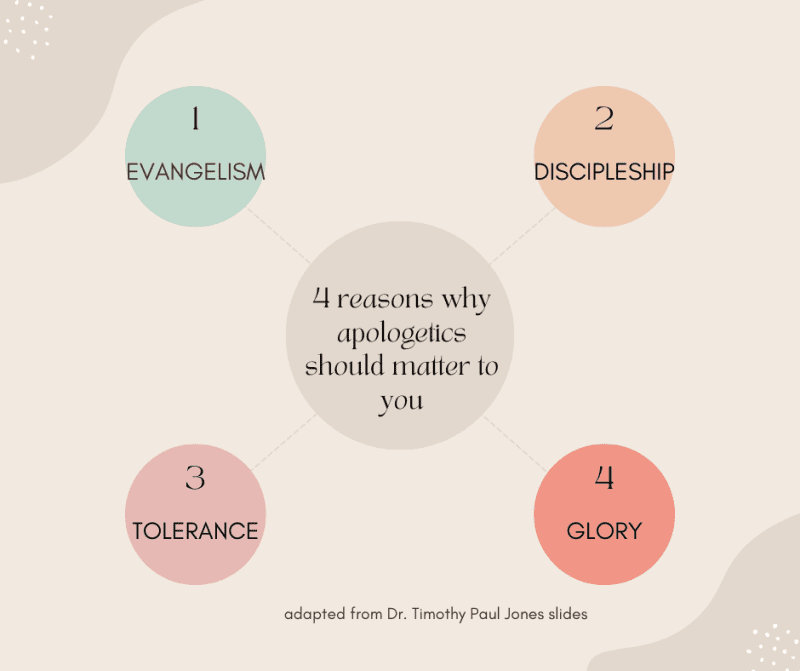[Originally published as part of The Interaction of Apologetics & Evangelism]
If Scripture is the very Word of God, God-breathed, then it is the sole infallible rule of faith and the ultimate authority in a believer’s life. Thus, the highest form of defending and explaining the truth (apologetics) is also expository teaching and preaching. It’s getting to the heart and God’s intended message as given to us in his Word.
Why?
In short, faith comes by hearing and hearing the Word of Christ (Romans 10:17), and “God’s Word is living and active and sharper than a two-edged short, piercing to the division of the soul and spirit, of joints and marrow, and discerning the thoughts and intentions of men” (Hebrews 4:12).
My aim is to point others to Christ, to trust in His Word, and to live and die by the all-sufficient and authoritative Word.
Before moving on, I should clarify how I define apologetics and how I think about the uses and functions of apologetics (see graphic below). A good summary of apologetics and why every believer should care is from my apologetics professor, Dr. Timothy Paul Jones, at SBTS.
A definition of apologetics: Apologetics is the church’s reverent, reasonable, and humble defense through Spirit-empowered words and lives- of the hope we have in the risen Christ, as this hope has been revealed in God’s word and God’s world.
It’s humility 1 Peter 3:15; reverence, 3:16; Rationality, 3:15; Hope in Risen and Returning Christ, 1:3; 1:13; Clean Conscience and Holy Life 3:16;1:16; 2:1-12; Using Special and General Revelation).
The earliest apologists saw the church itself as a living apologetic for the truth of the gospel. The practice of apologetics should be inseparable from the power of the gospel and presence of the Spirit (Romans 1:6; Luke 21:14; John 16:11-13). Apologetics is a means that God uses, but “the gospel….is God’s power for salvation.” The power is not in your evidence or your proclamation, but the power is in the gospel. ~Dr. Timothy Paul Jones, Christian Apologetics class, SBTS
The Four functions of apologetics:
- Defending the truth (defensive apologetics and in evangelism and discipleship)
- Making the case for the Christian worldview (offensive/positive apologetics)
- The case for Christian morality in the public sphere and why Christian views are good for society (tolerance). Early Christians frequently made the case for why Christianity should be tolerated in society and why biblical morals are good for society.
- Glory: leading others to “glorify” the Lord (taking captive every thought)
These functions are all subservient to the ultimate message: expositing the Word of God.

Sometimes, people think that because I give evidences for the veracity of Christianity, therefore the simple exposition and teaching of Scripture might not be as important to me. Nothing could be further from the truth. Such thinking would miss the key breakdown of these various categories of thought and result in dismissing their value.
Defending, explaining, and pointing people to truth in line with God’s Word flows out of a mind and heart that is set aflame with honoring the Lord with every thought (2 Cor 10:3–5; Luke 10:27).
Honestly, it shouldn’t even be seen as “intellectual Christianity” to approach subjects this way. It should just be seen as “thinking biblically about everything.” Basic Christian living and thinking. Nothing more and nothing less.
So, yes, sometimes I have taught certain classes that are more in-depth and function more in the “discipleship and leading someone to stand in awe of the Lord’s Work” realm (i.e. my Genesis classes or in-depth classes on the preservation of scripture). However, one should also understand that there is a different purpose for each class and teaching.
This past weekend I did an evangelism training class that I think every believer can understand and apply. I utilize David Platt’s gospel threads and how to explain and ask specific questions to point people to the truth of the gospel and lead others to Christ.
Sadly, if one hears me talk about the importance of defending the truth of God’s Word, they may erroneously assume that “apologetics” is a very distant and separate category from Biblical exposition. That would be an unfortunate misunderstanding. Both of those categories are intertwined.
Yes, we can distinguish between evangelism, apologetics, biblical exposition, and discipleship, but we should not separate these categories to our detriment.
If we do, we will see someone as “an apologetics-focused Christian” vs. “a biblical teaching Christian.” They are not mutually exclusive, nor should they be.
When this happens, we end up with someone like William Lane Craig, who starts with his philosophy to inform his biblical interpretation of Genesis and theology on creation science issues. The different fields of philosophy and theology need to complement each other. People get in trouble theologically when their ultimate authority on Genesis is Darwinist assumptions about earth history and geological evolution they then read the text.
As a result of this type of thinking separation, as well as varying degrees of anti-intellectualism, it seems like others view those who attempt apologetics as being “too intellectual.” This group tends to view thinking biblically almost as a vice and a hindrance to the church. They misunderstand “childlike faith” to mean childish, immature, and as if an anti-intellectual faith is a more mature faith.
Yes, everyone is not at the same level intellectually, but let’s not act like it’s a virtue to actively suppress honoring God with your mind.
Sure, some believers will pursue certain advanced studies in various fields (science, philosophy, theology) and not everyone is called to pursue advanced training. However, everyone is called to seek to love God with their mind to the best of their ability (keeping in mind their gifting, time, energy, personal and family needs, etc).
I am a Reformed Baptist. I hold to Sola Scriptura, which means I believe God’s Word is sufficient to accomplish all that it promises to do (Hebrews 4:12; Isaiah 55:11). In fact, at the beginning of my recent evangelism training, I said this:
Always point people to the Word of God & His gospel: Faith comes by hearing and hearing by the Word of God (Romans 10:14-17). Even in your reasoning with others (Acts 17:2), you want to point people to the Word, explain the Word, explain why only the Biblical worldview can account for reality and why Jesus and His Word is clear, authoritative and sufficient for life, salvation and godliness (2 Tim 3:15–17).
Here’s the deal: the gospel is so simple a child can understand it.
If you can speak, then you can explain the gospel. If not, then you can probably draw it out.
It’s so simple that you can just read or memorize Scripture and explain those Scriptures to someone, and the Lord will grant faith to many through this method of pointing to Scripture (2 Tim 2:24–27).
Reflections on the Importance of Pastors Being Trained in Apologetics
I believe Sunday morning worship should primarily be for the proclamation of the Word of God (2 Timothy 4:2–5) and not primarily for apologetics presentations (perhaps with rare exceptions). I obviously think apologetics training is important, but I firmly believe the regular diet of the church on Sunday morning should be the exposition of the Word of God. After all, this is “expository apologetics” when done right!
Every pastor is an apologist. While a pastor is primarily a shepherd rather than an apologist, we cannot separate the role of defending the truth and protecting the flock (apologist) from the role of a shepherd without great detriment to the health of the church. I’m not saying that every full-time apologist (i.e. creation scientists, professors, YouTubers, apologetics ministry leaders, such as myself) should be a pastor as well, but I am saying that all pastors should be apologists. It should become the norm in the church for pastors to at least have a basic understanding of cultural issues and core apologetics.
Part of the problem we face as only 37% of American pastors hold to a biblical worldview is their rejection of the need to train their flocks to think biblically about everything. It is a pastor’s responsibility to teach believers to take captive every thought to the obedience of Christ (2 Corinthians 10:5). They are to know and hang onto the Word of God well enough to teach sound doctrine and refute false teaching (Titus 1:9). The pastor should be a theologian and expositor of the Word, as well as as a shepherd, apologist, encourager, prayer warrior, and evangelist. (1–2 Timothy; 1 Peter 5).
Pastors must be biblically qualified, and this involves being able to defend the truth. The church of the future must understand this to be “faithfully different” in our secular, anti-Christian age.







